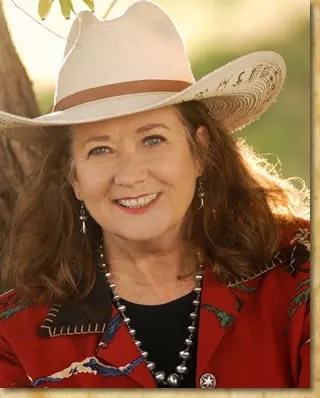
Lizmasterson.com

Audio By Carbonatix
Singer Liz Masterson, dubbed by her friends the “Lucille Ball of the Western music world,” died on December 30, at 71, after a five-year battle with ovarian cancer. Fellow Western music singer Patty Clayton, who has known Masterson since the early ’90s, says she got the nickname because she was just “crazy fun” and always cracking jokes.
“Her sense of humor is what kept her alive for so long, literally,” Clayton says.
Masterson, a Denver native, a heck of a good yodeler and a founding boardmember of the Western Music Association, started performing Western music in 1982, and six years later teamed up with Sean Blackburn, with whom she would tour and record until his death in 2005. The duo played thousands of shows around the country, playing traditional cowboy music Á la Roy Rogers, Dale Evans and Gene Autry while also releasing five albums together.
“They had a bunch of really great old nuggets that they always brought up and created to be their own, which were really nice arrangements,” Clayton says. “Their voices blended so well.”
After Blackburn died, Clayton says Masterson grabbed onto the reins, started to write by herself and continued to perform at many of the same events where she once played with Blackburn.
“She showed a lot of courage and strength,” Clayton says. “When she was diagnosed with ovarian cancer, it was the same thing. She never shed a tear, never felt bad, never felt sorry for herself, you know, for her affliction; she dealt with it every single day. She always found a humorous side to it. I think it was easier for her. I think she kept saying, ‘If I can’t laugh, I would cry.’ I think she found it just much easier to find humor inside of the most awkward and the hardest times, and shared those freely with us.”
While Masterson’s humor came through in her music and when she performed, Clayton says it also made her a great emcee at concerts and camps where she would teach singing and yodeling.
“She was very, very personable,” Clayton says. “She really got to know everybody before introducing them, so that you were befriended by her before you were introduced by her, and that wasn’t just her reading off a program. She really got to dig down deep and know a little bit more about who you were. She befriended a lot of people that way as well.”
Guitarist Mike Dowling, who collaborated with Masterson many times, hired her to teach at Greater Yellowstone Music Camp, which he and his wife, Jan, started near Jackson Hole, Wyoming.
“We were happy to have her,” Dowling says. “She was just a great entertainer, a good energy source, a great spark plug. And all those attributes that others give her, we concur with. She was a fine teacher, and everybody just loved her.”
As a teacher, Dowling says, Masterson was very engaging. “A lot of times at music camps, people wonder if they’re in the right place and at the right level – if they’re going to be comfortable, if they’ve never sung harmony before, and what’s it going to be like,” he says. “She had a very sort of disarming personality and took all the tension out of it and all the stress. She just made people feel comfortable and just got everybody singing together.”
About two years ago, Dowling’s wife suggested they help Masterson release one of her final studio albums: Linger Awhile.
“We kind of had an idea it might be her final record because she was sort of in pre-hospice when she recorded it, although she was up and around,” Dowling says. “She was getting to be out of treatment options at that point.”
Dowling says they wanted the album to be simple and honest, like a painting without too much paint on the canvas. With that in mind, he chose tunes for Linger Awhile that didn’t involve a lot of complicated harmonizations but rather showcased Masterson’s voice. Dowling picked the songs, which were lesser-known Western tunes, including some rarities by famed writer Cindy Walker, and since Masterson liked to sing jazz standards, as well, they also recorded cuts like Johnny Mercer’s “Dream” and the title track.
During the last week of her life, Masterson was visited by some musicians. She listened to them and tried to sing along.
“She’s a real stickler about getting the right chords,” Clayton says. “I guess she told somebody, ‘That’s the wrong chord,’ while they were playing. She had a little bit of sassiness to her.”
There will be a memorial celebration for Masterson from 2 to 4 p.m. on Sunday, February 4, at the American Mountaineering Center, 710 10th Street in Golden.